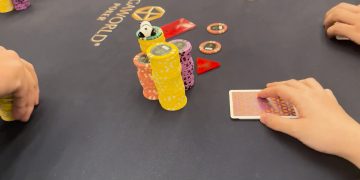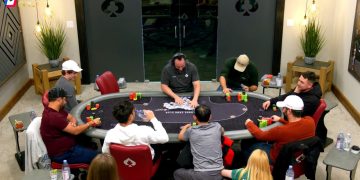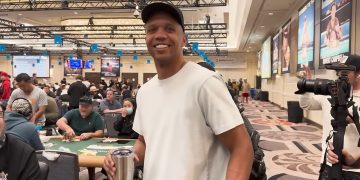What Is Poker Position? Position in poker is an underrated piece of poker strategy by countless new poker players. To win as a beginning poker player you need to know and appreciate poker positions. Position in poker just means where you are situated on the poker table in relation to the dealer button. The way you end up playing your game is going to be determined just as much by your poker position as anything else. You need to respect those poker positions and learn how to make the most of them.
What does it mean to have poker position at a poker table? That’s the question that players who want to win wants answered and a significantly underrated aspect of poker by many beginner players. For all the talk about perfect poker strategy and loving the art and science of the game, everyone really just wants to know how to win. That means not just taking the time to figure out how the game is played, but to figure out how all of those component pieces work together.
Most players understand that poker will, at some point, come down to the cards that are in your hand. They know that this means understanding when to play, when to fold, when to bet, and when to call. What most people forget is that the proper time to do all of these things is going to change not just by when they happen in the game, but due to where you are positioned at the poker table.
If you’re playing in a Texas Hold’em poker tournament, you need to know to work with your poker position. Poker positions are determined by the dealer button, and you don’t get to choose your place. The best position is being the dealer and second is the cutoff position, to sit directly to the right of the dealer – the spot where you can observe other players and really think about your decisions. The worst positions to be in is the blinds directly to the left of the dealer and has to play without any additional information.
In the end, though, it’s not where you are positioned it’s by how you use your poker positions to your advantage. To do that, you’re going to have to start by figuring out why your position at the table actually matters.
Poker Positions and Why They Matter

Poker positions matter because they have an impact on the rest of the game. You can think of them as being as important as the cards in your hand or the chips sitting in front of you. The way you end up playing your game is going to be determined just as much by your poker position as anything else, so you need to respect those positions and learn how to make the most of them.
As we’ve already stated, the players who are in later positions tend to have at something of an advantage over the other players. Why? Because they have more information. They’re the ones who get to see what’s happening and get to react, instead of being forced to guess at what is going to come next. The value of this is hard to overstate, as being able to figure out what your opponents are doing and respond in a way that preserves your own self-interest is a great way to take control of a game.
If late-position players get the big advantage, it’s only logical to assume that early-position players are at a disadvantage. While they’re going to be able to take control of how the round starts, they’re not working on any real data other than knowing their own cards. If you’re in that first position UTG, then, you’re having to do the most work and doing so with an entirely incomplete data set – the worst place to be.
Unfair Distribution
The unfair distribution doesn’t stop there, though. Later-position players have an easier time gauging the hands of their early-position opponents, and they have an easier time bluffing, semi-bluffing, and generally confusing the other players at the table. Late position players statistically tend to win more, and this means that these positions tend to be more profitable. They’re not invincible, though. Not by a long shot.
What we should learn, then, is that where you are positioned at the table is going to matter to how you play the game. The better your position, the bigger your advantage. That doesn’t mean that you get to be lazy, though – it just means that different positions are going to give you different types of options. Figuring out how to play from a position of strength means understanding the benefits and drawbacks that various poker positions will give you.
Looking at Poker Positions

So, now that you know that having position is important, you need to know what it means to play in different positions at the table. Every one of the table positions has a specific name and a particular role to play, so taking some time to memorize them will help you to get a better handle on what your position means to you and what it means for your opponent to be at a specific position.
The major poker positions in Texas Hold ’em poker is small blind, big blind, under the gun, middle positions, cutoff, and dealer button. The dealer button rotates around the table with each hand so that each player will have a new position for each hand.
At the beginning of each hand, the players receives two hole cards and the betting starts with the under the gun (UTG) position, they have the chance to fold, call the big blind, or raise. The later positions have the advantage of knowing how the players in early positions are playing. Are they folding, calling or raising? If the other players have all folded, later positions are in a good position from which to steal the button or if on the button, raise to intimidate the small blind and big blind into folding so you can steal the blinds. If a late position has a strong hand and other players have called, it is a good position for raising.
The Dealer Button
The dealer “button” position is the technically the dealer, the player who acts last and is considered the best poker position to be in.
The Cutoff Position
The cutoff position is the player in the seat to the right of the dealer button in a game of poker. It is the second-best position to be in.
Hijack Position
In poker the hijack position (or hijack) is a weird but power place to sit. It’s generally defined as the position two seats away from the button, but it’s also the seat that tends to be directly next to the player who is to the right of the dealer. This is called the hijack position because it allows the player to radically change up the state of play before it gets back to the cutoff.
If you’re playing in the hijack position it is where you can have the most fun and where you might need to be most cautious. You still have at least one player who you haven’t yet read, so getting too cocky can be a bad idea. If you’re smart, though, you can really leverage the utility of this position.
Middle Positions
The Middle position is exactly what it sounds like. You’re not in an early seat, but you’re not late. You aren’t in the blinds, either, so you’re going to be in a really weird position. You don’t have as much information as you’d have later, but you aren’t quite the tone setter that you’d be earlier. Instead, you’ll be left to react and hope that you’re doing a good job of reading the rest of the table.
UTG – Under The Gun
If you’re Under the Gun, you’re sitting next to the Big Blind. You’re the first player who has to make a move before the flop, and you’re going to set the tone of that hand going forward. There’s a tremendous amount of responsibility thrust upon the person who is under the gun, and even more pressure. If you can master this position, though, you can master Texas Hold’em.
Big Blind
The Big Blind has to pay the full blind regardless of what is in his hand and in newer tournaments the big blind must also pay the ante for entire table. If you’ve got the Big Blind, it’s advantageous to check simply because you’ve already paid the money to stay in. It’s important to see how players act when they’ve got the Big Blind, because this will tell you a great deal about their play style. An individual who folds despite being the Big Blind either has a huge stack, is overly cautious, or is trying to lure you into a false sense of security.
Small Blind
The dealer deals the first card to the position directly left of the dealer button the small blind. This is the first person to get cards in the hand. What’s more important, though, is that this is the first position who has to make a decision after the flop. The small blind is not an ideal position in which to be in because you’re always going to be acting on incomplete data.
When you’re the Small Blind, you’re going to be forced to put up half of the cost of the blind to play no matter what’s in your hand. Many poker players with the Small Blind will simply complete the blind bet before the flop simply because they are already paid half the money. These players, then, are often those who are willing to go in with a weaker hand.
Major Strategies by Poker Position

Every position has its own set of strategies. They’re what you need to master if you’re going to keep playing, especially when you know that you can’t guarantee that you’ll be in the position that you’d prefer. Take a moment to make sure that you’re prepared for a worst-case scenario as well as for your ideal position.
Early Positions
If you’re in an early position, you absolutely have to play smart. This is going to mean folding a lot of hands that less experienced players would think are fine, but you really won’t have much of a choice. You can’t reliably read what other players have yet because you have little, if any, information on which to rely. This is a bad place to be, but that doesn’t mean that you can’t win.
The good news is that when you play a hand, you’re going to play from strength. You’ll be able to reliably bet early and take out people who think they’re in a better spot than you. Players in early positions might have a harder time reading, but they also have a unique opportunity to play good hands like they’re going to win every time.
Middle Position
If you’re in the middle, you’re in a weird spot. You can’t quite take control of the game, but you have a fair bit of leeway than what you’d have a seat or two earlier. This is when you can start to go into the game even when you don’t have preferred hands and when you can start to practice your skills in bluffing and check-raising.
Don’t be afraid to start betting when the players behind you get cautious. It’s your time to shape the fate of the game, so make sure that you’re able to win real money. Be careful, though, because you are going to be read by those late positions.
Late Positions
If you’re in a late position, you both have more options and fewer options. On one hand, you’re going to be restricted by what the players who have already played have done. If they’re cautious or they don’t have anything, though, you have more options for staying in the game.
If you’ve got a major goal in a late position, it’s this – to stay in that position. Knock out later players so that you have an easier time controlling the flow of the game and putting earlier players on specific hands. The more effective you are at this, the more money you’re going to win in the long run.
Final Thoughts – Knowledge is Power
If you’ve learned anything from reading up on poker positions, it should be that the player who has the most information is the player who has the biggest advantage in any game. The more information you can gather from the rest of the table, the better chance you’ll have to win. Pay attention to the position you’re in and the positions of your opponents, so that you can get better at gathering information and using that data to make the most of where you’re positioned. See you at the WSOP!
♠ pokerjournal.org
Poker Position – FAQ
What does position mean in poker?
When you're in good poker position, it means you're one of the last people to act. This is the button, cutoff and hijack positions.
What is the cutoff position in poker?
The cutoff position is the second-best position behind the button. It means you're the second-last person to act. Acting late is great because you gather more information before acting.
What is late position in poker?
As stated above, late position is the button, cutoff and hijack. It's a good place to be because the decision making is easier.
What does SB and BB mean in poker?
SB means small blind. BB means big blind. The blinds are fees you must pay once per orbit so you don't just sit there and wait for AA or KK.
















Discussion about this post